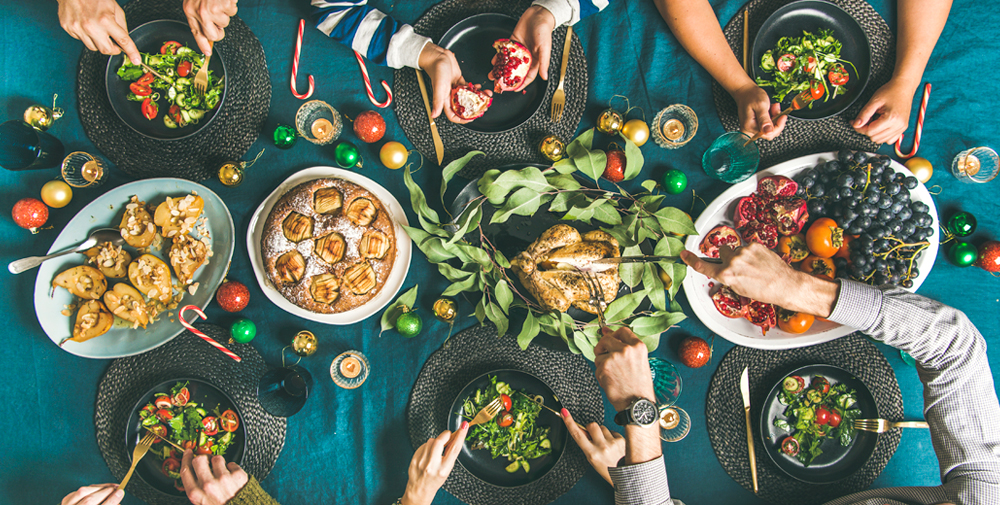With Halloween in October, Thanksgiving in November, and the winter holidays coming up, staying on track with your wellness journey toward the end of the year can certainly be challenging. Especially, with all of the deliciousness this time of year has to offer! So, here are eight tips on eating healthy during the holidays.
8 Healthy Eating Tips
Tip 1: Remember That The Holiday Season Is About Much More Than Food
While holiday themed foods and drinks are often the stars of the show at holiday parties, try to remember that the holiday season is about way more than just food. Instead of focusing only on the food and drinks at holiday gatherings, take time to admire the holiday decorations, enjoy the holiday entertainment, and make sure to spend quality time with your family and friends who you haven’t seen in a long time.
Tip 2: De-Mystify Holiday Food
Just because certain foods are considered ‘holiday foods,’ it doesn’t mean that you can only eat them during the holidays. By reframing your thinking and getting rid of the ‘now or never’ mindset that tends to pop up during the holidays, you’ll be in better control of your food choices. That’s why it’s so important to recognize that while ham, pecan pie, and stuffing are all foods that you typically eat during the holidays, you can also eat these foods whenever you’d like – not only during the holiday season!
Tip 3: Stick To Your Regular Meal Routine
Are you someone who tends to eat less before holiday parties because you want to ‘save’ calories for the meal you’ll be eating later in the day? Well, it turns out that this strategy can actually backfire and lead to you eating more than you initially planned because you’re so hungry from not eating enough during the day.
So, instead, eat regular, small meals throughout the day at roughly the same times that you normally would on a typical day. And in the morning, try to eat a healthy breakfast that’s high in fiber. This way, you’ll feel fuller for longer. You can also have a small, healthy treat before you go to the party like some hummus with fresh vegetables in order to make sure that you won’t be starving when you arrive.
Tip 4: For Hosts – Don’t Sacrifice On The Main Meal, Just Make Healthier Side Dishes
If you’re hosting a holiday gathering, the last thing that you want is for yourself or your guests to feel that you or they were cheated when it came to the holiday meal. So, go ahead and fix your traditional favorites such as stuffing and pie the way that you normally do each year. Just make healthier side dishes for everyone to enjoy with the meal.
So, instead of making side dishes such as green bean casserole, candied yams, and buttered mashed potatoes, you can make healthier sides such as steamed green beans, broccoli, and mashed sweet potatoes.
You can also lighten up your recipes with a few simple tweaks. For instance, you can reduce fat and calories by replacing 1 egg with 2 egg whites to cut cholesterol, substituting oil, margarine, or butter in baked goods with apple sauce to reduce fat, and using reduced-fat cheeses in casseroles. You can also replace sour cream with yogurt in your favorite holiday recipes.
Tip 5: Use A Small Plate (And Select Foods Carefully)
Research shows that we tend to fill our plates – regardless of the size of the plate! So, intentionally use a small plate so that you won’t be able to fit that much food on it. And when adding food to your plate, start with healthy foods like vegetables, fruits, greens salads, and lean meats.
After all, if you fill up on healthy food, chances are that you won’t be too hungry later on. And if you’re not feeling very hungry, you’ll be more likely to resist less healthy dishes that initially looked so good when you first saw them. And when it comes to less healthy dishes, select two or three that you really want to try and leave the rest.
If you’re a guest and know that there won’t be many healthy dishes at the holiday party that you’re going to, volunteer to bring some food to the party in order to make sure that there will at least be some healthier options for yourself, as well as the other guests in attendance. Some healthy, easy-to-prepare food options are fresh veggies with a low-fat dip, fresh fruit, low-fat cheese and multi-grain crackers, or chilled shrimp.
Tip 6: Eat Mindfully (And Take A Break)
Really allow yourself to truly enjoy your favorite holiday flavors when you’re eating. Since it’s the taste of the foods that is satisfying, truly pay attention to the taste, aroma, and texture of the foods that you’re eating.
A smaller amount of food can be much more enjoyable than a large amount, and it also leaves more room for tasting other options that you’d like to try. And since it takes about 20 minutes for your brain to tell your stomach that it’s full, take a short break between servings in order to help prevent overeating.
Tip 7: Stay Hydrated
Staying hydrated is vital to avoid overeating because people often mistake hunger for thirst. One study even found that adults who drank two cups of water before meals shed 40% more weight over a 12 week period than participants who didn’t. And another study found that drinking water before meals naturally leads to eating less.
Also, try to limit your intake of high-calorie alcoholic drinks like eggnog or martinis. Since we drink them, rather than eat them, we often fail to recognize these types of drinks as significant sources of calories. Alcohol also lowers inhibitions and increases the likelihood that people will go back for second or thirds, as well.
Tip 8: Move Your Body At The Party
After eating a big holiday meal, try not to sit around talking, watching TV, or playing cards. Instead, incorporate physical activity into your get-together with your loved ones.
You can take a family walk after dinner or play a game like charades that involves movement. And if you’re attending a party with music, make sure to hit the dance floor since physical activity is a great stress reliever, as well as a good way to keep your weight in check.
*The links used in this article are being provided as a convenience and for informational purposes only; they do not constitute an endorsement or an approval by Iovate Health Sciences International Inc. or any of its affiliates (“Iovate”) of any of the products, services or opinions of the corporation or organization or individual. Iovate bears no responsibility for the accuracy, legality or content of the external site or for that of subsequent links. Contact the external site for answers to questions regarding its content.







